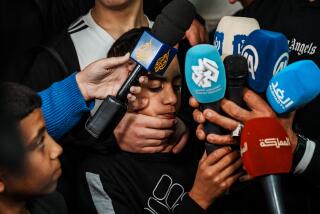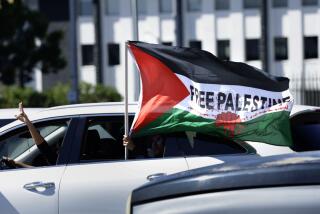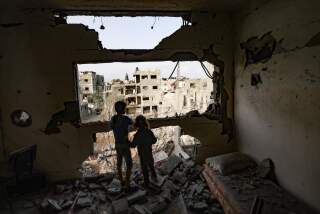Jordanian’s Mother Denies He Has Ties to Terrorism
- Share via
ZARQA, Jordan — Sitting on floor cushions in her simple concrete home Friday, the mother of the Jordanian man accused of being the crucial link between Al Qaeda and Saddam Hussein passionately denied the charges.
Um Sayel described the youngest of her three sons, Abu Musab Zarqawi, as a deeply religious, affectionate and friendly man. She said that he had never been involved in politics or expressed particular interest in the United States, but that he had traveled to Afghanistan to fight Soviet troops more than a decade ago, and more recently had been in Pakistan.
Zarqawi’s name, previously familiar only to those who follow investigations of Al Qaeda, blazed into the spotlight Wednesday when U.S. Secretary of State Colin L. Powell identified him as the head of a “deadly terrorist network” now based in Iraq, and as an associate of Osama bin Laden.
Powell said in a presentation to the U.N. Security Council that Zarqawi specialized in poisons and explosives. He charged that Zarqawi had found his way to Iraq and, with Baghdad’s knowledge, established a terrorist training center with a focus on poisons and explosives in the wild northeastern part of the country.
Zarqawi is also accused of having ties to terrorist cells in at least four Western European countries.
By turns angry and tearful, Um Sayel, a slight woman with quick brown eyes, rebuffed such charges, depicting her son as a devout man who was persecuted by Jordanian authorities after he returned home from fighting the Soviets.
“All these accusations are false and lies,” she said. “The source of all of it is the Jordanian mukhabarat [secret police], because how would America know about him? He’s not so well known.”
“If they want to attack Iraq, attack it, but why accuse a young man of all those things unjustly?” she asked. Taking exception to the idea that her son could have become an expert in explosives and poisons, she said he had not been good in science.
“He doesn’t even have a diploma, he is not so well educated,” she said. “All that is said are lies.”
Efforts to reach Jordanian intelligence officials for comment about Zarqawi were unsuccessful.
A look at Zarqawi’s family and city provides a reminder of Jordan’s deep desert roots. It is a portrait of poverty, of Islamist politics and a society with long-standing connections to the Bedouin tribes that used to dominate the region.
The small house on a dusty street where Zarqawi grew up and left for good only three years ago is a mere 40 minutes from the center of Amman, but it is a world apart from the capital city’s glossy shopping centers and Western ways.
On Fridays, the Muslim holy day, all but a few fruit stands are tightly shuttered. Every woman walking on the street is veiled, and most wear long robes.
Although it is common in the Arab world for women to wear head coverings, and for older women such as Zarqawi’s mother to wear long dresses, in Zarqa it is also a sign of religious conservatism and preference for Islamist politics.
On a recent Friday in Zarqa, the voices of the preachers in the mosques, amplified by loudspeakers, could be heard in the still streets, the words of one sometimes overlapping those of the preacher in the neighboring enclave.
Although Powell said Zarqawi is a Palestinian Jordanian, his mother said firmly that he is member of the Bani Hassan tribe, which is deeply rooted in central Jordan.
His home, like others in the neighborhood, is surrounded by a high wall, a feature more common in rural desert areas to shield women from prying eyes. Men, other than family members, are not allowed inside, and recent requests by male journalists for interviews with Um Sayel were rebuffed.
In the living room, where the family also sleeps on quilts laid out on thin mattresses on the floor, the predominant decorations are framed verses from the Koran. Over the front door hangs a gilded plaque that says simply “Allah.”
Zarqawi was born in 1966 as Ahmed Kalaylah (Abu Musab Zarqawi is a name derived from the name of one of his sons and his hometown). He was a good student, his mother said. But before he even finished high school, he became passionate about studying the Koran.
“He liked to study the Koran, only the Koran,” she said. “We tried to convince him to continue his studies [for his high school diploma], but he refused. Even for free, he said he wouldn’t continue and go on to university.”
“He memorized the whole Koran, he liked it more than the other children,” she recalled, smiling as if she could see Zarqawi in her mind’s eye, sitting in the corner reading Koranic verses.
His sister Magidah, 24, another of the family’s 10 children, nodded as her mother spoke. While her mother was clothed in a worn white head scarf and long dress, she was dressed in a more modern style, maroon pants and a turtleneck, and left her head uncovered except when she went outdoors. She, too, loves the Koran and is learning tajwid, the traditional method of chanting scriptures.
After school, Zarqawi went to work for the municipality. His father was a mukhtar, or neighborhood leader, to whom people came to resolve problems. He died nine years ago.
Zarqawi married and started a family in his early 20s.
“He loved to play with his children too much, he was very affectionate,” said his mother.
But about the same time, he headed to Afghanistan to fight the Soviets. When he returned home, authorities fearful that he had been radicalized in Afghanistan imprisoned him, his mother said. He was jailed for 7 1/2 years, then released in March 1999 in a general amnesty for prisoners serving time for nonviolent crimes.
However, his brushes with the law were far from over. He tried to find work, but his mother said the intelligence services “harassed him” and encouraged him to leave the country. By the end of the summer he gave up looking and moved to Hayatabad, a suburb of teeming Peshawar in northwestern Pakistan, near the Afghan border. His sister was living there with her husband, who was teaching Arabic language and Islamic law.
Um Sayel went with her son and stayed a month to visit her daughter before returning to Jordan. Zarqawi’s wife also followed him to Pakistan with their four children but later returned to Jordan.
“I don’t know what he did in Pakistan, some simple trade, buying and selling honey,” Um Sayel said.
Later in 1999, Zarqawi was one of a group of people indicted in Jordan in a foiled “millennium plot” to bomb the Radisson SAS hotel in Amman, the capital. He was tried in absentia and sentenced to 15 years in prison.
Now intelligence officials here are quoted in the local media as saying they believe that by that time he was in contact with Bin Laden and was fast becoming one of Al Qaeda’s top 20 operatives.
In December, Jordanian officials identified Zarqawi as the mastermind of the October slaying of Laurence Foley, a 60-year-old administrator of the U.S. Agency for International Development in Jordan. Two men were arrested, a Jordanian and a Libyan. They are said to have confessed to links to Al Qaeda and Zarqawi. Powell made similar assertions in his presentation to the Security Council.
“Powell is wrong -- he is a liar,” Um Sayel said.
Not far beneath her anger is a mother’s anxiety. She used to get a phone call from Zarqawi every few weeks. But now he has not been in touch since the Eid feast that ended Ramadan two months ago.
“He apologized the last time he called for not sending money for Eid; he said the financial situation was not good,” she said.
Um Sayel does not have a proper photograph of her son. His sister reluctantly pulled out the only one they have: an Arab newspaper that carried his prison picture on the front page under a headline that read: “From a troubled past in Zarqa to Al Qaeda.”
More to Read
Sign up for Essential California
The most important California stories and recommendations in your inbox every morning.
You may occasionally receive promotional content from the Los Angeles Times.













